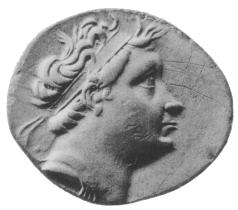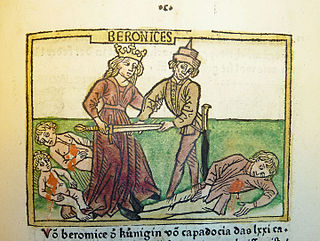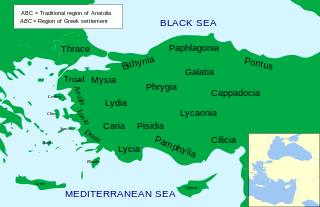The play
The source for the play is a 12-line section [1] within a longer work by the ancient historian Justin on Rome's policies with respect to its allies, in particular the princelings of the East. Corneille, caught up as he was in the Fronde, then at its height, was inspired to write a play whose basic premise is a clash between aristocratic and political ideals - a clash between hero and state.

Justin was a Latin writer who lived under the Roman Empire.

In historiography, ancient Rome is Roman civilization from the founding of the Italian city of Rome in the 8th century BC to the collapse of the Western Roman Empire in the 5th century AD, encompassing the Roman Kingdom, Roman Republic and Roman Empire until the fall of the western empire. The civilization began as an Italic settlement in the Italian Peninsula, conventionally founded in 753 BC, that grew into the city of Rome and which subsequently gave its name to the empire over which it ruled and to the widespread civilisation the empire developed. The Roman Empire expanded to become one of the largest empires in the ancient world, though still ruled from the city, with an estimated 50 to 90 million inhabitants and covering 5.0 million square kilometres at its height in AD 117.
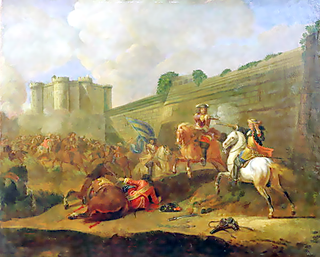
The Fronde was a series of civil wars in France between 1648 and 1653, occurring in the midst of the Franco-Spanish War, which had begun in 1635. King Louis XIV confronted the combined opposition of the princes, the nobility, the law courts (parlements), and most of the French people, and yet won out in the end. The dispute started when the government of France issued seven fiscal edicts, six of which were to increase taxation. The parlements pushed back and questioned the constitutionality of the King's actions and sought to check his powers.
The tragedy portrays two brothers, Nicomède and Attale, both sons of the same father - Prusias, king of Bithynia. Attale, Prusias' son by his second wife Arsinoé, has been brought up in Rome, from where he has recently returned. Nicomède, by contrast, hates Rome, having been inspired by Hannibal's example: loyal, courageous and proud, he commands Prusias' army. [2] The ambitious Arsinoé, who holds sway at court, dominating her husband, detests Nicomède, and seeks to put her young son on the throne in place of his older brother. In a further twist, Laodice, the young queen of Armenia who has been placed under the tutelage of Prusias by her father, is loved by both of the brothers, though her preference is for Nicomède.
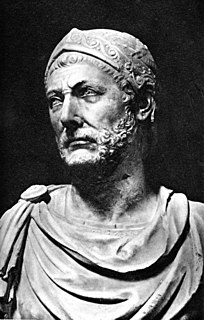
Hannibal Barca was a general and statesman from Ancient Carthage who is widely considered one of the greatest military commanders in history. His father, Hamilcar Barca, was a leading Carthaginian commander during the First Punic War (264–241 BC). His younger brothers were Mago and Hasdrubal, and he was brother-in-law to Hasdrubal the Fair, all also commanded Carthaginian armies.
The action: the people rise up in revolt, proclaiming Nicomède as their king after he falls victim to the machinations of Arsinoé, who has him removed after he arrives at court and placed in Roman custody (in the person of Roman ambassador Flaminius). However, a stranger releases him. With Prusias and Flaminius now opting to flee, Arsinoé finds herself without support when the prince-cum-hero Nicomède returns. Prusias and Flaminius, their predicament now dire, decide to return in order to die with her, but Nicomède chooses to pardon all three of them.
The mystery man who freed Nicomède turns out to be none other than Attale, and he it is who disentangles the web of intrigue. Despite this, however, all the plaudits fall on Nicomède. He returns to the throne, gradually taking over the reins of power over against the opposition of Prusias, who relinquishes them despite himself, having previously wanted to send Nicomède to Rome as a hostage. [2] He closes the play with a response that is not far short of comedy, which has the effect of making him a king devoid of credibility. The way is then open for Nicomède, who gains both power and the love of Laodice thanks to his generosity of spirit. He calms the popular uprising that had been clamouring for him to be king, agreeing to live in friendly alliance with Rome if the empire will refrain from reducing the kingdom to servitude. [2] Although family harmony is re-established at the end of the play, the genuineness of it seems to be very much in doubt.
Because of this apparently happy ending, Nicomède is sometimes not considered to be a genuine tragedy. Literary critics Gustave Lanson and Paul Tuffrau observe that tenderness and passion feature not at all in the play - a drama in which the idea of courage as a noble ideal reigns supreme. [1]
This page is based on this
Wikipedia article Text is available under the
CC BY-SA 4.0 license; additional terms may apply.
Images, videos and audio are available under their respective licenses.








